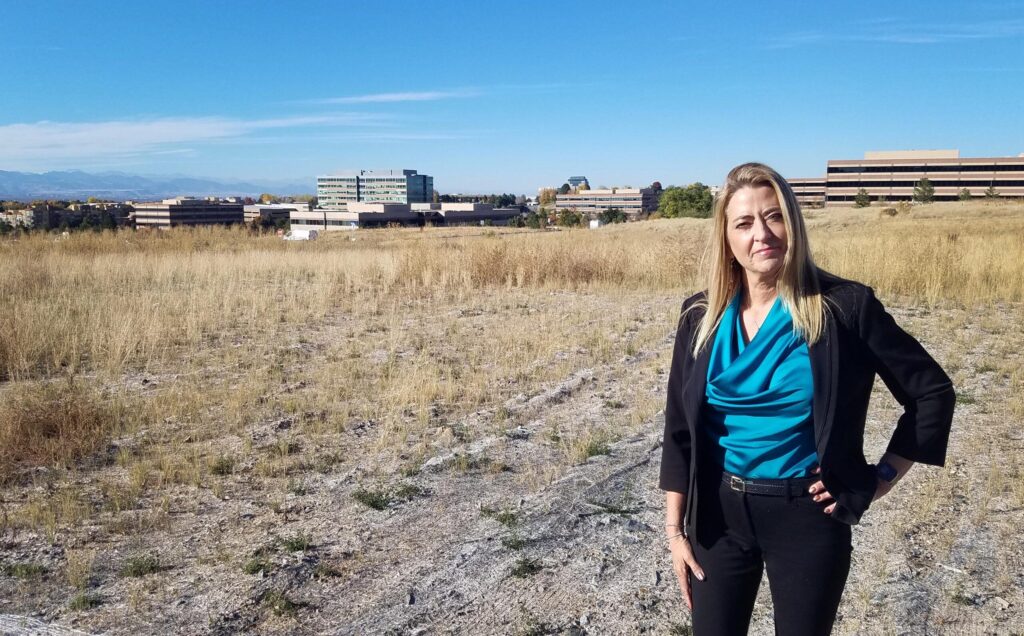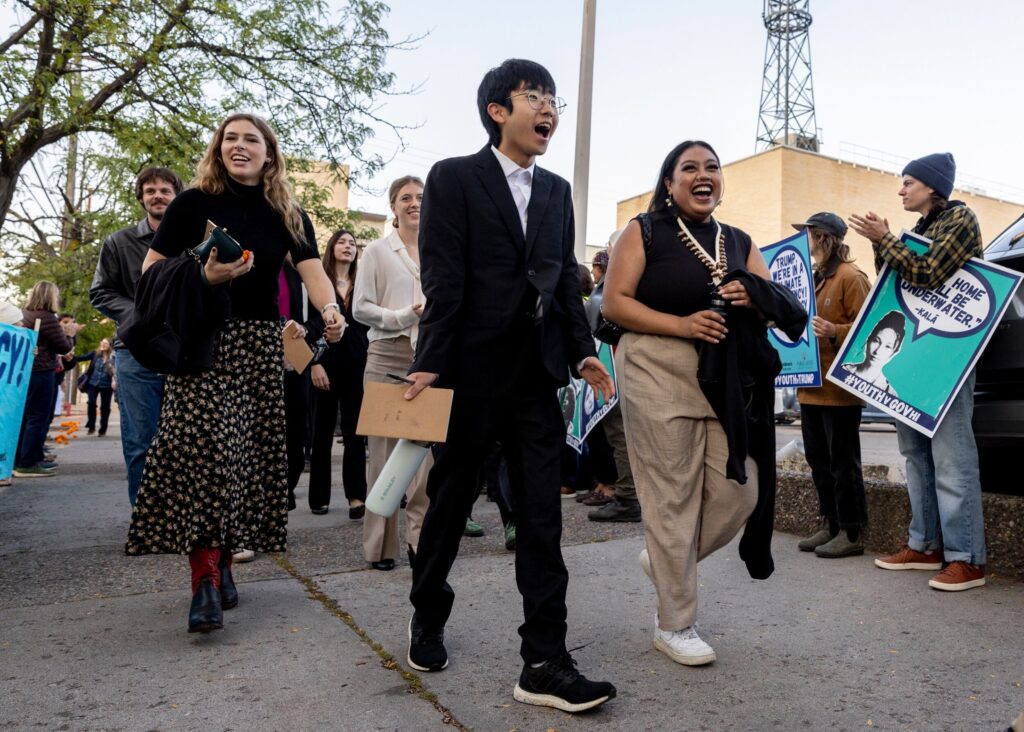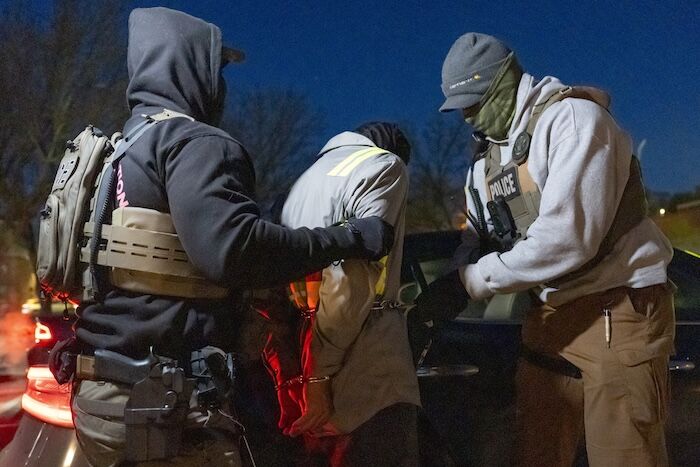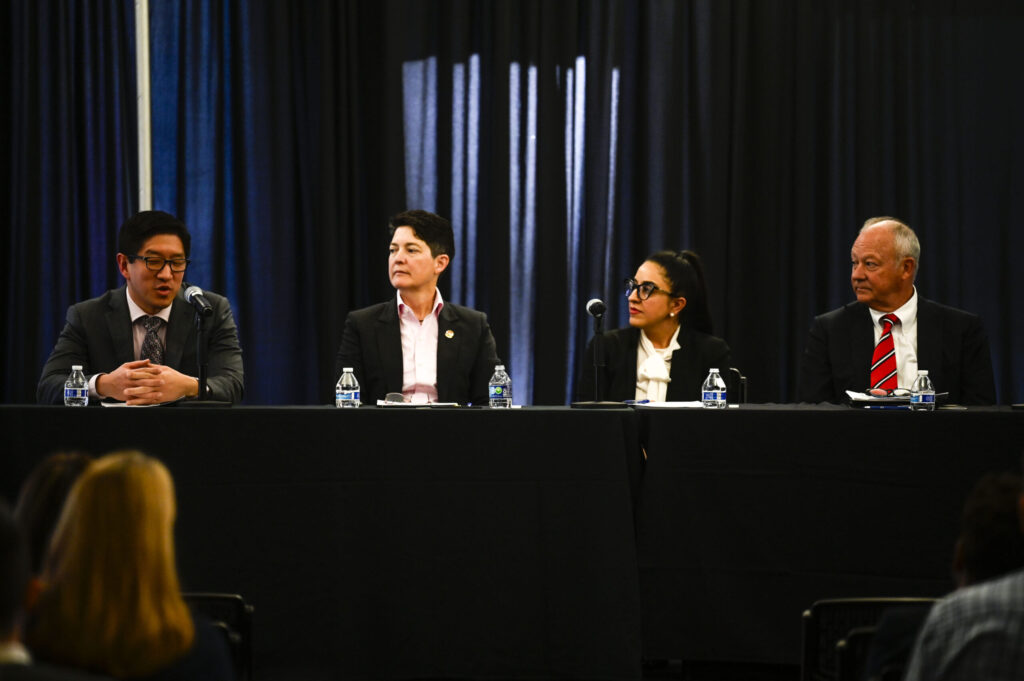Colo. Supreme Court rules Doug Lamborn didn’t make primary ballot

In a stunning decision, the Colorado Supreme Court ruled Monday that Republican U.S. Rep. Doug Lamborn didn’t gather enough valid petition signatures to qualify for the June primary ballot in his bid for a seventh term.
Lamborn, however, plans to “immediately” file a federal lawsuit challenging the Colorado law that could keep him off the ballot, a campaign spokesman said.
Five GOP voters in Lamborn’s 5th Congressional District had sued to remove the incumbent from the primary last month, charging that some of the paid circulators hired by his campaign to gather petition signatures weren’t Colorado residents, as the law requires.
The Colorado secretary of state’s office had originally determined that 1,269 of the 1,783 signatures turned in by Lamborn were valid.
A Denver District Court judge mostly sided with Lamborn earlier in April, with Judge Brian Whitney throwing out 58 signatures gathered by one circulator but letting the other challenged signatures remain, leaving Lamborn with 1,211 signatures of the 1,000 required to make the ballot.
But in Monday’s unanimous ruling, the high court overturned a portion of the lower court’s ruling, tossing another 269 signatures, which left the congressman 58 signatures short of the 1,000 required to run in the primary.
“The Secretary (of State) may not certify Representative Lamborn to the 2018 primary ballot for CD5,” the ruling concludes. “We recognize the gravity of this conclusion, but Colorado law does not permit us to conclude otherwise.”
Major-party candidates in Colorado can get on the primary ballot two ways – by going through the caucus and assembly process, or by gathering signatures from fellow party members.
Lamborn intends to ask a federal judge to rule that portions of the state statute cited by the justices should be tossed.
“We are disappointed by the outcome and we believe it was wrongly decided,” campaign spokesman Dan Bayens said in a written statement. “We are immediately bringing an action in federal court to overturn the part of Colorado law that deprives voters who have petitioned to have Congressman Lamborn on the ballot of their Constitutional rights.”
At issue is a Colorado requirement that anyone gathering petition signatures for candidates be a state resident. The Republican voters who filed the lawsuit argued that seven circulators hired by the Colorado Springs-based firm that managed Lamborn’s petition drive weren’t really residents, even though they were registered to vote in Colorado and declared they were residents on paperwork they filed with the petitions.
Michael Francisco, the Colorado Springs attorney representing the voters who sued to keep Lamborn off the ballot, said he was delighted with the decision.
“The justices ordered that nobody’s above the law, and everybody’s got to play by the same set of rules,” he said in an interview.
But Francisco called the announcement by the Lamborn campaign a “political stunt” and waved off the notion a federal court might strike down the state ruling on constitutional grounds.
“It’s not surprising (the Lamborn campaign) will make a last-ditch effort to try to get him on the ballot,” Francisco told Colorado Politics. “Can you see the disconnect? First, he says the people he hired complied with the law, and now that he’s lost he’s switching tactics to say, ‘OK, I didn’t comply with the law because it’s unconstitutional.'”
Francisco added that he’s already addressed an argument raised by Lamborn’s attorneys – that enforcing the Colorado law would deprive voters who signed Lamborn’s petition of their First Amendment rights if their signatures were tossed because circulators have to be state residents – and doesn’t believe it holds water.
Ryan Call, a former state GOP chairman and an attorney for the Lamborn campaign, on Monday told Politico that there are “a number of cases that find that the residency requirement for circulators as unconstitutional.”
The Lamborn campaign didn’t respond to emails and phone calls seeking additional comment.
It’s too late for Lamborn to qualify for the June 26 primary ballot any other way – which could effectively end his tenure in Congress, which began in 2006 when he won a crowded primary in the heavily Republican district centered in El Paso County.
According to the Colorado secretary of state’s office, Lamborn could mount a write-in campaign in the general election – he’d have to file a notice with state officials – but has missed deadlines to run as an unaffiliated or third-party candidate.
But Deputy Secretary of State Suzanne Staiert told Colorado Politics she wouldn’t count Lamborn out yet, suggesting a federal court could strike down the residency rule for candidates’ petition circulators because the state doesn’t impose the same requirement on those gathering signatures for ballot initiatives.
While Staiert’s boss, Secretary of State Wayne Williams, was a defendant in the lawsuit decided Monday – it challenged his earlier ruling that Lamborn had collected enough signatures – she said the office won’t be involved in initiating a federal appeal.
“The court didn’t find we breached a duty, so it’ll be for Lamborn to do this,” she said. “We may at some point have to resolve this residency issue, but that’ll be for another day.”
Staiert tore into the high court’s ruling, calling it “preposterous” and “hyper-political.”
“It’s really a very disturbing decision for voter registration,” she added, noting that the ruling also affects the factors used to determine residency for voters, not just petition circulators.
Francisco pushed back against Staiert’s characterization, noting that the high court’s ruling was unanimous and that bipartisan groups of current and former state lawmakers – including several who had a hand in the legislation governing the case – submitted amicus briefs opposed to Lamborn and the Colorado secretary of state’s legal arguments in the appeal.
“Describing this case as being hyper-political has no basis in fact,” Francisco said.
He added: “The decision shines light on illegal activity by a select number of circulators and candidates. This ruling will make a more level playing field for candidates following the rules.”
Four other Republicans are running for the seat and will appear on the primary ballot – El Paso County Commissioner Darryl Glenn, state Sen. Owen Hill, retired Texas state judge Bill Rhea and former Green Mountain Falls Mayor Tyler Stevens.
Hill, who got on the ballot through the assembly process, applauded the ruling.
“I’m encouraged that the court ruled to protect the integrity of our elections process,” Hill said in a statement. “I’m looking forward to continuing to earn the votes of my friends and neighbors across the district.”
Stephany Rose Spaulding, an associate professor of Women’s and Ethnic Studies at the University of Colorado Colorado Springs, is the Democrats’ nominee for the seat.














